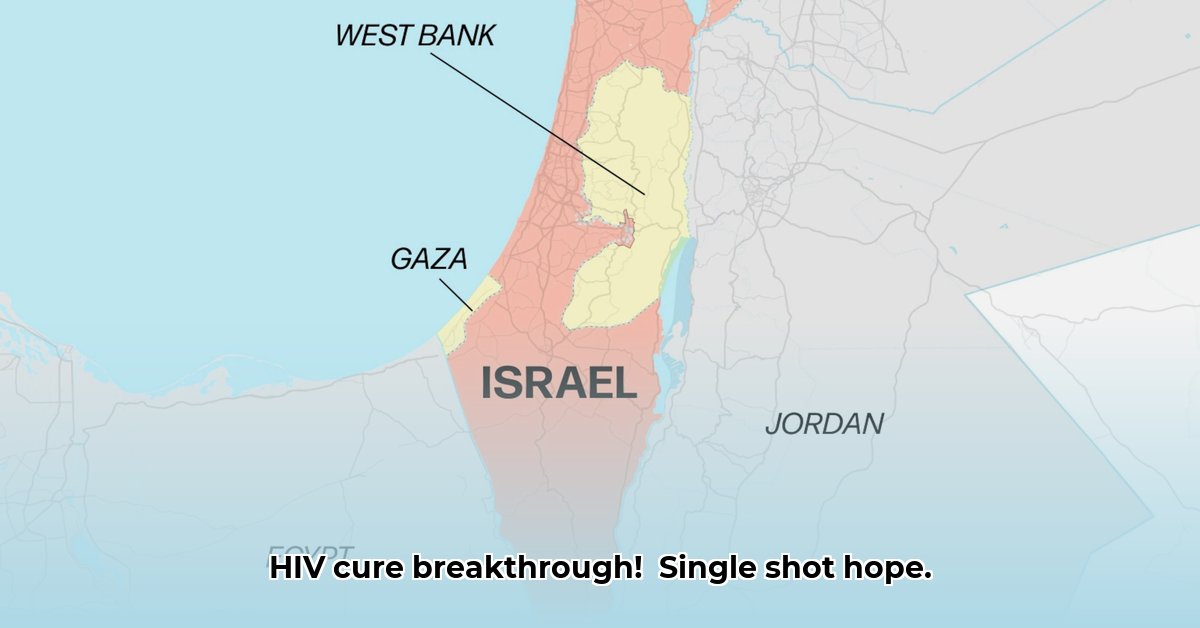
A New Era in HIV Treatment?
Imagine a world where HIV, a virus that has claimed millions of lives and continues to impact countless others, could be eradicated with a single injection. This isn't science fiction; researchers at a leading Israeli university are pioneering a groundbreaking gene therapy that’s showing incredible promise in early trials. While still in its early stages, this single-shot approach, employing CRISPR-Cas9 gene editing technology, has demonstrated significant results in animal models, offering a beacon of hope for a future without HIV. However, it's crucial to approach this hopeful development with measured optimism, acknowledging the considerable hurdles ahead before widespread clinical application becomes a reality.
How Does This Revolutionary Gene Therapy Work?
The innovative treatment targets B-cells, a type of white blood cell critical to the body's immune response. Using CRISPR-Cas9, a revolutionary gene-editing tool often described as "molecular scissors," scientists modify these B-cells in the laboratory to produce potent antibodies uniquely equipped to neutralise HIV. These enhanced B-cells are then reintroduced into the body using a harmless adeno-associated virus (AAV) as a delivery vehicle – essentially, a safe "taxi" transporting these supercharged immune cells to their target. Early animal trials have indicated a significant and sustained suppression of the HIV virus using this one-time treatment. This is a monumental leap forward in the fight against HIV, but the results are from animal models, and caution is paramount. What works in animals doesn't always translate directly to humans.
The Promise and the Challenges Ahead
The potential implications of this breakthrough are transformative. Imagine a future where people living with HIV could be freed from a lifetime of medication and the constant worry associated with the virus. A single injection could potentially change lives immeasurably. However, several significant challenges remain before this becomes a clinical reality in South Africa and globally.
One major concern is safety. While the AAV delivery system is generally considered safe, thorough investigation is required to rule out any unforeseen immune reactions. The CRISPR-Cas9 technology itself carries a small risk of unintended genetic edits, which scientists must rigorously monitor. Another key question is the long-term efficacy of this treatment. Will the modified B-cells continue producing protective antibodies for a lifetime, or will they need regular boosts?
Key Hurdles to Overcome:
Rigorous Human Trials: Extensive clinical trials across multiple phases (Phase I, II, and III) are essential to assess safety and effectiveness in human subjects, involving large participant groups and rigorous data collection.
Regulatory Approval: Even with successful human trials, navigating regulatory hurdles with bodies such as the FDA (in the USA) and equivalent South African regulatory bodies will be crucial for approval and market release.
Accessibility and Affordability: Making this therapy accessible and affordable to those who need it most worldwide presents a major logistical and economic challenge that requires careful consideration for equitable distribution.
Long-Term Safety: A Critical Consideration
Professor Ruthie Abergel, Head of Immunology, Tel Aviv University, emphasizes, "While the initial results are very promising, long-term safety and efficacy are paramount. We must thoroughly investigate potential off-target effects of CRISPR-Cas9 and monitor for any delayed immune responses." This sentiment underscores the need for comprehensive, long-term monitoring in any future human trials.
The potential for off-target effects—where the gene editing tool accidentally modifies other parts of the genome—is a concern. Long-term monitoring is vital to detect any such effects, as is continued vigilance for immune reactions to the treatment itself or the possibility of the virus evolving resistance.
A Balanced Perspective: Hope and Caution
The Israeli research represents a remarkable advancement in the fight against HIV, offering a tangible glimmer of hope for a future free from this devastating virus. However, it's vital to maintain a balanced perspective. Transforming this promising research into a widely available therapy will require substantial time, resources, and ongoing scientific investigation. The potential rewards are immense, but responsible, thorough research must guide this hopeful path forward.
LSI Keywords: HIV cure, gene therapy, CRISPR-Cas9, single-shot treatment, HIV research, gene editing, immunotherapy, clinical trials, HIV medication, anti-HIV antibodies, B-cells, adeno-associated virus (AAV), long-term safety, off-target effects, immune response, viral escape, accessibility, affordability, South Africa, global health.